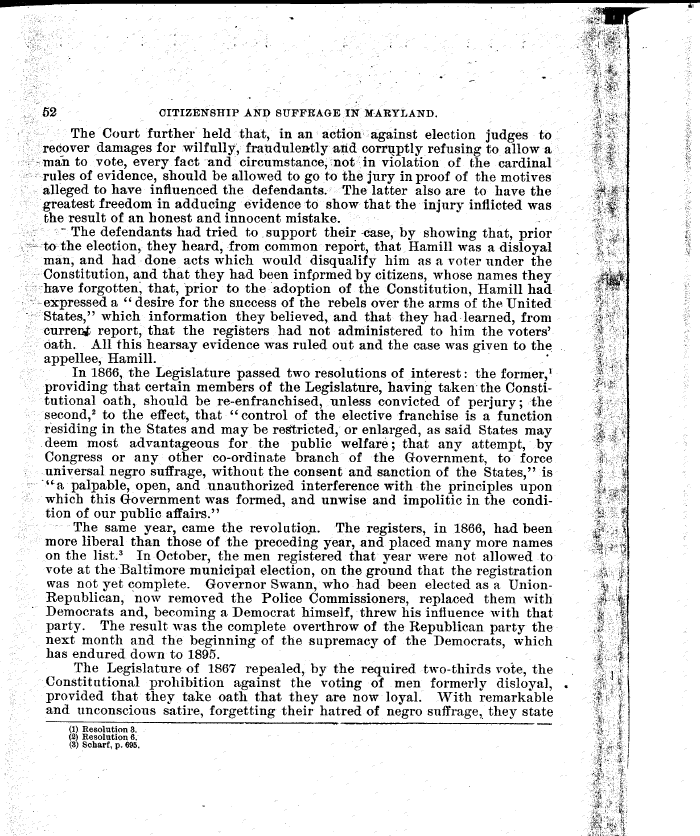|
5`Z CITIZENSHIP AND SUFFRAGE IN MARYLAND.
The Court further held that, in an action against election judges to
recover damages for wilfully; fraudulently arid corruptly refusing to allow
a
-- -ma,n to vote, every fact and circumstance,not yin violation of the
cardinal
rules of evidence, should be allowed to go to the jury in proof of the
motives
alleged to have influenced the defendants. The latter also are to have the
greatest freedom in adducing evidence to show that the injury inflicted was
the result of an honest and innocent mistake.
- The defendants had tried to, support their -case, by showing that, prior
---to-the election, they heard, from common report, that Hamill was a
disloyal
man, and had done acts which would disqualify him as a voter under the
Constitution, and that they had been infprmed by citizens, whose names they
have forgotten, that, prior to the adoption of the Constitution, Hamill had
--expressed a " desire for the success of the rebels over the arms of the
United
- States," which information they believed, and that they had learned, from
currer4t report, that the registers had not administered to him the voters'
oath. All this hearsay evidence was ruled out and the case was given to the
appellee, Hamill.
In 1866, the Legislature passed two resolutions of interest: the former,'
providing that certain members of the Legislature, having taken -the Consti-
tutional oath, should be re-enfranchised, unless convicted of perjury; the
second ,z to the effect, that " control of the elective franchise is a
function
residing in the States and may be restricted, or enlarged, as said States
may
deem most advantageous for the public welfare; that any attempt, by
Congress or any other co-ordinate branch of the Government, to force
universal negro suffrage, without the consent and sanction of the States,"
is
"a palpable, open, and unauthorized interference with the principles upon
which this Government was formed, and unwise and impolitic in the condi-
tion of our public affairs."
The same year, came the revolution. The registers, in 1866, had been
more liberal than those of the preceding year, and placed many more names
on the list.' In October, the men registered that year were not allowed to
vote at the Baltimore municipal election, on the ground that the
registration
was not yet complete. Governor Swann, who had been elected as a Union-
Republican, now removed the Police Commissioners, replaced them with
Democrats and, becoming a Democrat himself, threw his influence with that
party. The result was the complete overthrow of the Republican party the
next month and the beginning of the supremacy of the Democrats, which
has endured down to 1895.
The Legislature of 1867 repealed, by the required- two-thirds vote, the
Constitutional prohibition against the voting of men formerly disloyal,
provided that. they take oath that they are now loyal. With remarkable
and unconscious satire, forgetting their hatred of negro suffrage,, they
state
(1) Resolution S.
(2) Resolution 8.
(3) Scharf, p. 695.
|

